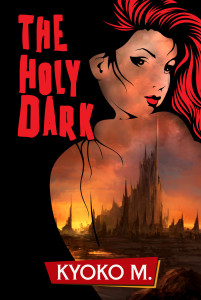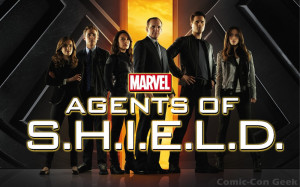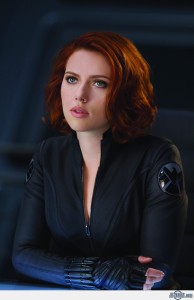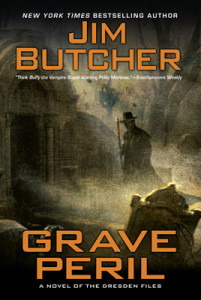
Conjure at your own risk.
Welcome back to the Dresden Files read and review! Yes, this one is a bit late, but once you see my review, you’ll know why. As always, major spoilers for The Dresden Files’ Book Three, Grave Peril.
First, a warning: I consider Grave Peril’s alternate title to be “The Novel in which I Want to Punch Susan Rodriguez in the Throat.” Just a heads up.
But the good news is that Book Three opens with one of the better supporting characters in the series: Michael Carpenter, a Knight of the Cross. The Knights are warriors entrusted with swords that draw their power from the nails of the Cross Jesus Christ was crucified on. They are stone cold badasses, and Michael is no exception, but the great thing about him is that he’s not what you’d expect from a warrior of God. He’s not only personable, but he’s so kind and wise and levelheaded that you almost wonder how he can balance slaying monsters and being a father and husband so well. He’s good people, and one of Harry’s closest friends. They are like night and day, and in a good way.
If you’ve been reading my reviews, or hell just the introduction to this review, then you know I’m not a fan of Susan Rodriguez. I don’t dislike her, per se, but I certainly don’t care for her all that much. Unfortunately, the book opens with Michael pressing Harry about admitting that he’s in love with Susan, and I admit this is one of my least favorite openings in the series because the foreshadowing is basically beating you over the head. I’m not talking about the series-long foreshadowing, either. Just for this book, it’s really too blatant that they are talking about Harry’s love life while rushing through the streets of Chicago to go beat up on a ghost. It doesn’t fit. It feels forced, and it’s strange because most of Butcher’s plot and character threads are more subtle. You rarely ever get a moment where it feels like he’s standing next to you shouting “THIS WILL BE IMPORTANT LATER” like in lazily written fiction. Not to mention this scene is rather exposition-y, and most of the Dresden Files don’t open that way either. Once I’m done with my full re-read and review, I intend to try to personally rank which books I liked the best, and I’m pretty sure this one will be in the bottom five.
That being said, Harry and Michael are in a hurry to protect a bushel of babies from a nasty ghost that is trying to feed on their life forces. It’s another one of those rare scenes where you feel creeped the hell out, and proof that Butcher can still write horror elements that make you want to burrow under the comforter just to be extra safe.
Side note: There is a fantastic little character nugget I want to address in this scene, which is the following narration by Harry: “But I’m a sucker for a lady in distress. I always have been. It’s a weak point in my character, a streak of chivalry a mile wide and twice as deep.” I’ve seen people on Tumblr bashing Harry Dresden for being sexist, and this makes me want to throat-punch them super hard. Yes, Harry does have sexism issues early in the books, but it’s fully acknowledged as a weakness, and he gets over it after a couple different villains exploit this quality in order to manipulate or destroy him. It’s on purpose, for God’s sake. Nothing makes me angrier than people flinging hate at something that is 100% intended as an issue for the character, and it’s not like Harry thinks he’s in the right. He knows the limitations of his personality and admits he’s at fault. What more do you want?
After resolving the mess with the first ghost, Harry meets a new client Lydia, a magic practitioner who’s looking for a talisman to protect her from a hostile spirit. He figures she’s trying to play him, but since he’s still a good person, he lends her the talisman he wears around his wrist. It’s actually a bit rare, too, that we get scenes out of chronological order, because Harry recaps how he got where they were. I suppose it’s because the opening scene had better momentum, but he could have started from that point, if you ask me. But again, keep in mind, this is Book Three and Jim Butcher was still a newbie author getting his feet wet, so he makes some mistakes like a human being.
We jump back to Nevernever, where Harry and Michael defeat the ghost, but don’t leave before Harry’s “faerie godmother” Lea catches up with them. She is a scary, scary lady, and that’s putting it mildly.
I do love the fact that after saving the babies in the nursery wing, Michael and Harry end up in jail. A lot of superheroes or characters in urban fantasy settings always seem to get away, but Harry’s been arrested more than once, and it’s realistic. For example, I used to hate the fact that Anita Blake used to murder indiscriminately and yet never set foot in a jail cell, so Michael and Harry ending up in jail is kind of great. Luckily, the boys are bailed out by Michael’s’wife, Charity, who is delightful because she’s eight months pregnant and hates Harry’s guts. Their relationship is just precious.
Susan bails Harry out and takes him home—after Harry deals with a stunning case of Cannot Spit It Out in terms of those three little words (Insert me rolling my eyes here)—and then they get jumped by vampires. Yep. Just another day in the life of Harry Dresden.
The vamps drop off an invitation to a promotion ceremony for Bianca, a vampire who really does not like Harry and would love the chance to eliminate him without getting herself killed in the process. It’s here that we enter one of my main problems with Susan, who insists that she should attend the ceremony with Harry. Look, I get it, she’s a reporter with Lois Lane levels of intensity, but it still pisses me off that she completely underestimates the monsters she’s willingly throwing herself to over a damn story. I know there are plenty of people who defend Susan’s actions, but to me, it’s just stupid and it ends up precisely the way you think it would. Susan is a Muggle. Sure, she’s smart, but she has zero skills in protecting herself against monsters, so her motivations are weak and it just irks me to no end that she endangered herself, and Harry, that way just for the scoop on a story no one will believe anyway.
The other thing that irks me is that this decision sticks Susan so firmly into the Damsel in Distress category, and it’s yet another sign of Butcher being a young writer at the time. Over the course of the Dresden Files, he goes on to write some of the absolute best, most three dimensional female characters I’ve ever had the pleasure of reading. I love the way Butcher writes women. Love it. Susan’s nagging nonsense in this book is his weakest writing by far, since we all know what’s going to happen on foreshadowing alone and not because this is my second read-through of the book. She’ll get herself in trouble and Harry will have to bail her out, and that’s why it’s such a struggle for me to get through this novel. It would be different if Susan had proficiency with magic, self-defense, or a mix between the two like Harry, but she has neither, so all she can do is roll her neck and give him attitude without being able to back any of it up. No me gusta.
Moving on, Michael and Harry visit the church of St. Mary of the Angels. They notice that the parking lot is a mess, evidence that a very dangerous apparition of some sort is indeed after Lydia. It tried to get into the church after her, but couldn’t, and so Harry moves elsewhere to consult with Mortimer Lindquist, a “psychic” who is actually just a con artist, but he has connections to Nevernever, so Harry bullies some answers out of him. It turns out he’s trying to skip town because he’s noticed that the barrier between the human world and Nevernever has started leaking and a walking nightmare came through the other night. He leaves Harry his notes and bounces out of Chicago.
Harry returns home to find two detectives from the S.I. (Special Investigations) division of the police department waiting to take him somewhere on orders from Lt. Karrin Murphy. (*insert me cheering here because Murphy is my Queen*) When he gets there he finds one of the recently retired cops who helped him out, Micky Malone, has been mind-raped into attacking his wife and is tied down to prevent him from hurting anyone else. He finds out it was done to him by the same entity who set the ghost Agatha on the newborns at the hospital in the opening scene. Harry manages to get it off of him, but he knows shit is about to get real, and soon.
Minor note: this is also the first time Harry looks at Murphy with The Sight, and he sees her as a powerful, beautiful guardian angel.
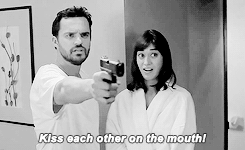
He returns home to consult with Bob about what they’re dealing with and then after getting some theories he sends him out to look for Lydia. Harry himself goes out searching for her via a trace on the talisman he lent her and finds her in the clutches of the douchebag vampires who “invited” him to Bianca’s soiree. He manages to stay alive (humorously noting how he always seem to destroy buildings during these fights) but is too hurt to save Lydia from being kidnapped by the vamp siblings. Doped up with vampire saliva (no, really), he gets home and passes out, only for the ghost baddie to try and eat him in his sleep. He manages to make it down to a summoning circle in his lab and Bob gives him the skinny.
It is here that we are introduced to one of my favorite original concepts of the series. It turns out the thing chasing Harry and killing things is actually a ghost demon. As in the ghost of a demon Harry, Murphy, Michael, and the cops killed in the past. Is that not a boss freaking villain? That’s why it’s so powerful and hard to stop. I’m giddy with this idea because I previously had never thought about a demon being able to permanently die instead of just ceasing to exist or going back to the spirit world.
Harry and Bob theorize that Bianca stirred up trouble in Nevernever and basically indirectly got the demon’s ghost to come for Harry as her oblique way to get rid of him. Once they figure out what it is, Harry puts together that since this is about revenge, it’s going to go after those who are responsible for its death, meaning MY QUEEN MURPHY IS IN DANGER.
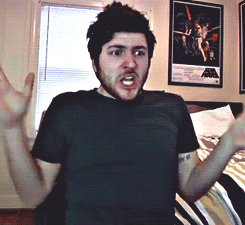
Harry gets there and manages to invoke a spell to put poor mind-tortured Murphy to sleep and then runs off to warn Michael, but unfortunately, the demon ghost—still pretending to be Harry—has kidnapped Michael’s wife, Charity.
Harry tries to fight it off, but it’s too powerful, so of course his “godmother” Lea shows up and offers to help in exchange for his cooperation. She doesn’t give him power, the bitch, just a clue, and luckily Michael shows up to help fight it off. Y’know, just as Charity goes into labor. *facepalm*
And oh, it gets better. Lea’s cheating ass wants Harry to come to her now even though she didn’t give him any help, and when Harry tries to ward her off with Michael’s sword, she takes the bloody thing and disappears. And Charity’s baby is born with complications, implying that he possibly won’t survive the next 36 hours.
…
Remind me again why I was born with feelings?
Seriously, why? I don’t want to feel things. Because this shit hurts.
So after this horrific emotional crucifixion, Harry performs a spell that binds the demon directly to him, meaning it physically cannot go after any of his friends or loved ones, which is essentially like putting a hit out on himself, but honestly, who can blame the guy? The demon ghost just tried to kill a pregnant woman in labor. Fuck him upside down with a chainsaw.
In order to locate the Big Bad, Harry and Michael go to Bianca’s party. I must also bounce up and down like a stupid fangirl because this is the book where we are introduced to the incomparable Thomas Raith, a White Court vampire. If you’re a fan of the series, you too are probably giggling madly at his first appearance since you know how important Thomas is further into the series. If you’re new to the series, let me just say that Thomas is going to provide so much heart and entertainment to the rest of the books he’s in that you will immediately understand why I love him so much. I’m not trying to oversell him, but for real, Thomas is my third favorite character in the entire series.
To that end, I must also inform you that Harry “Smartass” Dresden attends a vampire masquerade ball dressed as a motherf@^king vampire, cheap plastic fangs and all. God, marry me, Harry.
They later come to find that since Bianca can’t openly attack Harry, she’s slipped vampire venom into all the drinks, which Harry unknowingly downs. Now he has to find the culprit behind the demon ghost while drugged out of his mind. Oh, and predictably, Susan’s stupid ass weaseled her way to the party.
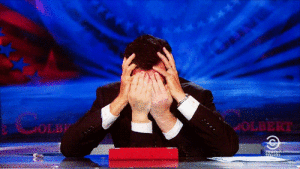
So Lea pops back up and reveals another layer to her plan. Since Harry reneged on his deal with her three times in a row, he’s sent into a fit of pain and Susan stupidly bargains a year of her memories in order to spare him the pain. This means Lea chooses the year Harry met Susan, so she has zero recollection of him at all.
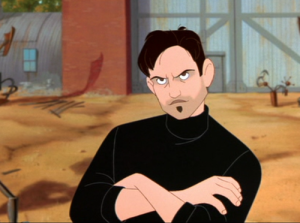
See? SEE? Do you get why I want to bitchslap Susan straight to the f@*king moon? None of this shit would’ve happened if she had listened to Harry and stopped trying to muck around in things she absolutely knows nothing about and has no stake in. She has caused him all this pain just for her own curiosity and her own ego. I really wish I could express my teeth-clenching fury at Susan’s actions.
Rage aneurysm aside, Harry finally narrows down the Big Bad to Mavra, the leader of the Black Court of vampires. So he’s got a Red Court vampire and a Black Court vampire breathing down his neck and looking to sink their fangs into it together. Ah, to be popular.
I hope your feels are still nice and loose because it’s time for more gut-punching! Harry, Michael, and Thomas make it out alive, but Justine (Thomas’ girlfriend) and Susan didn’t and Harry had to set things on fire to get them out, meaning he doesn’t know who or what survived. Thomas shows up with Michael’s sword and asks for their help to get the girls back, but before they can mount up, Lydia gets possessed by the Nightmare and attacks them, but Thomas manages to distract her and they banish the demon ghost temporarily, which they later find out is actually the ghost of the sorcerer Kravos. Not as cool as the ghost demon idea, but cool enough.
They plan to infiltrate Bianca’s stronghold via Nevernever, but of course, like the cockroach she is, Lea shows up once again. However, our delightful team knew she was coming so Harry promptly poisons himself (no, really) to weasel his way out of the deal with her.
Sadly, though, Bianca had a trap laid for them when they leave Nevernever. Womp, womp, womp.
I’m sure you’re wondering how it gets worse, and it does, because Harry wakes up in a prison cell to find —DRUM ROLL—Susan has been turned into a vampire.
…
God, I f@*king hate Susan in this book.
Long story short, Harry manages to save his idiot lover and escape the baddies. The good guys win at a very, very steep price. Susan disappears to figure out how to be a vampire and a colossal f@$king idiot, Murphy and Harry attend Kravos’ funeral just to make sure the piece of shit is really dead this time, and I breathe a sigh of relief in finally finishing this whopper.
It’s really hard for me to rate this book. On the one hand, plot-wise, it’s better than Fool Moon, which had way too much damsel!Harry and it had pacing issues. This one is much more straight forward and throws sucker punches left and right that make you feel like your soul has been turned into jello. However, this is a weaker show of Butcher’s writing for the fairer sex. Almost all the girls in this particular book get stuck in the damsel role aside from the villains Bianca and Mavra, who are smart and terrifying and so they almost balance it out. All the girls on the side of good are either kidnapped or out of commission, and that doesn’t fly with me since I know Butcher can and has done better.
Plus, Susan. God. I just want to bash her head in with a rock. I don’t know what Harry sees in her besides tits because she hasn’t got a brain in this novel. Not a brain cell, for that matter, but I’ve ranted enough.
Overall, Grave Peril has some fantastic action, sob-worthy emotional moments, and some really creative elements that get my motor going, but the weak female characterization prevents me from liking it as much as the previous two books.
Overall Grade: 3 out of 5 stars
We catch up with our beloved gangly wizard next time in Book 4, Summer Knight. Be there or be square.
